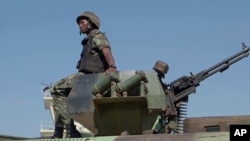The U.N. Office for the Coordination of Humanitarian Affairs, known as OCHA, is seeking $413 million in emergency aid to support over 1 million people in northern Mozambique dealing with climate disasters and an insurgency concentrated in the province of Cabo Delgado.
OCHA Mozambique representative Paola Serrao Emerson told a media conference in Maputo on Friday that her organization’s efforts to deal with the souring humanitarian situation in the southern African nation face financial problems.
According to the U.N, a total of 2.3 million people need humanitarian assistance in the northern provinces of Cabo Delgado and Nampula, but her organization is operating under a tight budget.
"We are looking for $413 million for Cabo Delgado or war in Mozambique, and of that we have received just about $43 million or so, just over 11%, so we are woefully underfunded," she said. "Normally at this time of the year we would at least 20 or more percent funding.”
According to Emerson, food insecurity compounds the vulnerability of the internally displaced people, host communities and returnees alike.
Mozambique is regularly exposed to cyclones, floods and droughts, damaging private and public infrastructure.
In 2023, Tropical Cyclone Freddy, a storm of record-breaking length, hit Mozambique’s northern region twice with destructive winds, extreme rainfall, and widespread flooding.
Droughts, which have become more frequent, are also a dire concern, as 80 percent of the population of more than 33 million depends on rain-fed agriculture.
"Humanitarian organizations, the U.N., national and international organizations are supporting people every day with food assistance, with health support, with child support assistance, with mental health psychiatric support amongst many others throughout Cabo Delgado," she said. "However, the funding situation is difficult to provide comprehensive multi-sectoral support to all areas that are affected.”
The news comes at a time when terrorist attacks have increased in northern Mozambique. Last month, missionaries, priests and religious sisters were forced to flee from remote towns and villages to Pemba and other large cities, which are overwhelmed with displaced people as the insurgency in Cabo Delgado intensifies.
At the same time, troops from the Southern African Development Community, or SADC, have begun to draw down due to financial issues.
Defense Minister Cristovao Chume told state-run Radio Mozambique on Friday that the end of the mission cannot be seen as a rupture in cooperation with SADC.
He said the SADC military mission is leaving Mozambique because it fulfilled the objective for which it was created — to stabilize the north of Cabo Delgado and recover areas controlled by terrorists.
Mozambican President Filipe Nyusi says his country’s armed forces should take a more prominent role in counterterrorism operations, despite some challenges.
Since 2017, the insurgency in Cabo Delgado, waged by a group that claims affiliation with Islamic State, has terrorized civilians and caused interruption to several multi-billion-dollar oil and natural gas projects.




